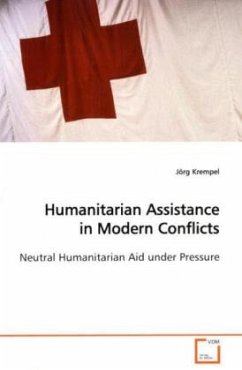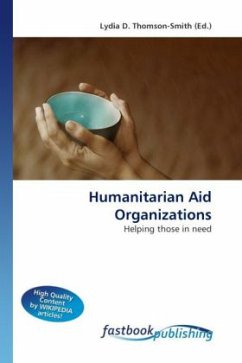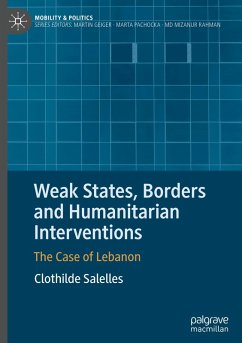
Humanitarian Assistance in Modern Conflicts
Neutral Humanitarian Aid under Pressure
Versandkostenfrei!
Versandfertig in 6-10 Tagen
32,99 €
inkl. MwSt.

PAYBACK Punkte
16 °P sammeln!
During the last 15 years one could observe a new trend whereby military forces were assigned humanitarian roles as a means to use humanitarian assistance in a broader political sense, such as development aid and state building. This trend weakened the perception of humanitarians as neutral and impartial. Humanitarian workers were perceived as part of the armed forces and thus as legitimate targets. Many have debated this subject in recent years. The author takes a step back to analyze the underlying legal principles of humanitarian aid which might entail useful guidelines for the way ahead. De...
During the last 15 years one could observe a new
trend whereby military forces were assigned
humanitarian roles as a means to use humanitarian
assistance in a broader political sense, such as
development aid and state building. This trend
weakened the perception of humanitarians as neutral
and impartial. Humanitarian workers were perceived
as part of the armed forces and thus as legitimate
targets. Many have debated this subject in recent
years.
The author takes a step back to analyze the
underlying legal principles of humanitarian aid
which might entail useful guidelines for the way
ahead. Departing from an examination of the
principles of impartiality and neutrality, he
elaborates on the development of humanitarian
assistance from the Balkan to Iraq, taking the
emerging problems such as the issues of blurring
responsibilities and staff security into
consideration. After some reflections on the
changing patterns of conflict, the author takes a
strictly legal approach in examining the legal basis
of humanitarian assistance, concluding with some
recommendations.
This monograph targets civilian and military
assistance workers alike, as well as academics.
trend whereby military forces were assigned
humanitarian roles as a means to use humanitarian
assistance in a broader political sense, such as
development aid and state building. This trend
weakened the perception of humanitarians as neutral
and impartial. Humanitarian workers were perceived
as part of the armed forces and thus as legitimate
targets. Many have debated this subject in recent
years.
The author takes a step back to analyze the
underlying legal principles of humanitarian aid
which might entail useful guidelines for the way
ahead. Departing from an examination of the
principles of impartiality and neutrality, he
elaborates on the development of humanitarian
assistance from the Balkan to Iraq, taking the
emerging problems such as the issues of blurring
responsibilities and staff security into
consideration. After some reflections on the
changing patterns of conflict, the author takes a
strictly legal approach in examining the legal basis
of humanitarian assistance, concluding with some
recommendations.
This monograph targets civilian and military
assistance workers alike, as well as academics.












